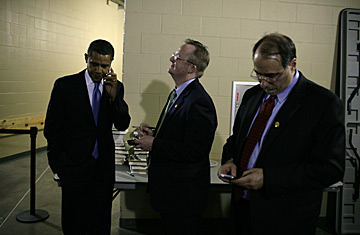
Barack Obama, his chief strategist David Axelrod, right, and communications director Robert Gibbs confer before a campaign event in St. Paul, Minn.
In the nearly three weeks since Barack Obama clinched the Democratic nomination, two things are clear: Obama's operation has some huge advantages over the opposition — and Team Obama makes a lot of unforced errors.
Just as Republican pollsters had expected, Obama took the lead in national polls and edged ahead in some key statewide matchups after he became — finally — the nominee. He hired staffers in virtually every state and hinted that he could raise perhaps $500 million for the fall campaign. Al Gore was brought on board in the key battleground state of Michigan (just as John Edwards had been a few weeks before). Hillary Clinton will even join him for a brief unity tour this week. Normally, this would be called a strong second act.
But the campaign has also made it share of strange, self-inflicted mistakes, suggesting that as Obama Central scales up its operation to prepare for the convention, pick a vice president and run a truly national campaign, it is developing some kinks in its once-smooth-functioning command and control.
The first blunder came last weekend when David Plouffe, the campaign manager, suggested to a group of potential donors that Obama might not need to win Ohio to win the election next fall. Asked about it later, Plouffe said "You have a lot of ways to get to 270" electoral college votes — which may be true, but why in the name of Youngstown would one ever say it? All that sort of talk does is invite Ohio voters to look elsewhere for an alternative to a candidate they are already a little uncertain about. To say nothing of Ohio Democrats, who did not exactly swamp Obama with votes in the March 4 primary (he won exactly 5 of the state's 88 counties.) I wonder how many days of clean-up visits those remarks added to Plouffe's plan to contest the Buckeye state — or whether his comments could prove to be a self-fulfilling prophecy.
The second miscalculation is a bit more obscure, but will also have ramifications through the summer and perhaps beyond. After Obama's preferred veep-vetter, Jim Johnson, stepped down because of questions about possibly preferential mortgages he received, Obama's campaign put a target on the back of A.B. Culvahouse, the top veep-hunter in the McCain camp. While it is true that Culvahouse has done work for Fannie Mae and Lockheed Martin, he is also one of the few Republicans in Washington that Democrats trust, and even turn to for help because of his sound political and legal judgment. But by putting a bulls-eye on the venerated attorney, Obama's aides made it harder on themselves to hire anyone with Washington experience as they ramp up through the summer. Anyone with any federal pleaders as clients, they were suggesting, will be fair game. The Culvahouse gambit is similar to the foolish campaign promise Bill Clinton made in 1992 when he vowed to reduce White House staff by 25 percent; once elected, he found himself short-staffed on almost every front and many avoidable mistakes followed.
But the Ohio and Culvahouse episodes were, most likely, spur of the moment errors. Harder to explain is the Patti Solis Doyle Miscalculation. Hillary Clinton abruptly sent Solis Doyle into purgatory several months ago when her campaign stumbled. So when Obama tapped Solis Doyle to take charge of his eventual running mate, he was sending a visible-from-space signal that Clinton would not be named to the number two spot. And what good did that serve at the very moment the campaign was trying to woo Clinton's donors, court her ardent supporters and win over the candidate herself? "Just stupid," said a top Clinton fundraiser this week. Clinton and Obama will go on their brief unity tour this week, but the merger deal will not close now until the convention, a source close to both Clintons reported this week.
Could these unforced errors outweigh Obama's rising polls, his bulging war chest or the field operation unfolding in places Republicans haven't had to defend in years? Probably not. But they are the sorts of mistakes you make when you think you can't make any. And in politics as elsewhere, that is often when the most costly decisions are made.
